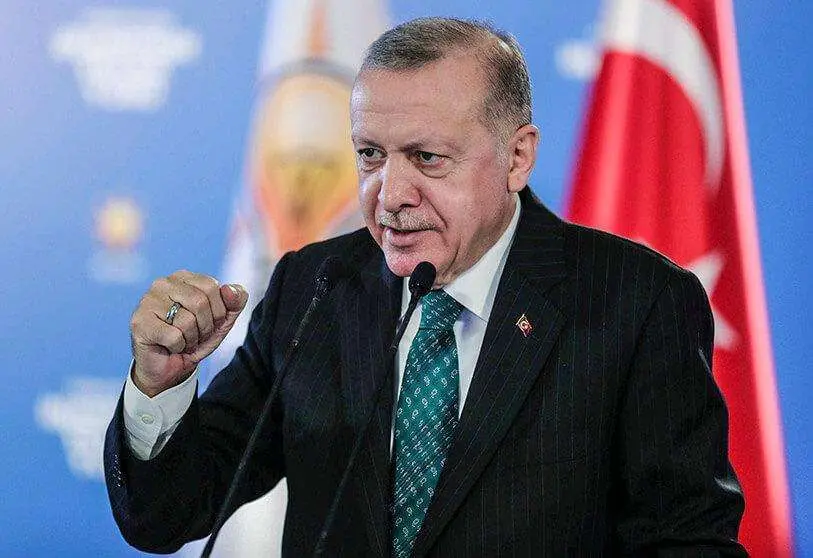Turkey positions itself as mediator in the Libyan crisis between Dbeibé and Bashagha

Turkey has been a key player in Libya for years. Firstly, through its support for the Government of National Accord (GNA) against the Libyan National Army (LNA), and now through its support for the current government of Abdul Hamid Dbeibé.
Through these moves, Ankara seeks to expand its influence in the region and protect its interests. As Felipe Sánchez Tapia, an analyst at the Spanish Institute for Strategic Studies (IEEE), points out, Turkish President Recep Tayyip Erdogan is trying to establish himself in the country with the aim of increasing his weight in Africa, gaining access to Libyan energy resources, facing regional competition from Egypt and delimiting areas of sovereignty in the eastern Mediterranean. In order to maintain these interests, Erdogan is now seeking a political solution after clashes between rival groups have intensified in the country.

Fathi Bashagha, Prime Minister appointed by the Tobruk Parliament, attempted to re-enter Tripoli last weekend, clashing with pro-Dbeibé militias. Bashagha managed to reach the capital last May but had to leave shortly after due to fighting. His new attempt sparked violent fighting that left 32 dead and hundreds wounded, according to Ministry of Health figures.
In this context, both leaders have recently travelled to Turkey to try to work out a political solution to the current crisis. As several Libyan analysts point out to Al-Arab, Turkey has benefited from the withdrawal of several influential countries in Libya, especially Russia due to the ongoing war in Ukraine and the 'lack of enthusiasm' of the US. "Ankara has become a mecca for visits by Libyan officials seeking an international body capable of bringing them together, listening to them and advising them," they add.
#Libya Milli Birlik Hükümeti Başbakan Yardımcısı Ramadan Abu Janah’la Libya’daki gelişmeleri ve seçim sürecini değerlendirdik.
Met w/ Ramadan Abu Janah, Deputy PM of Government of National Unity of Libya. Evaluated recent developments & the election process in Libya. ???? pic.twitter.com/XwyGqkrZyb— Mevlüt Çavuşoğlu (@MevlutCavusoglu) August 31, 2022
Dbeibé, Prime Minister-designate of the Libyan Political Dialogue Forum (LDPF), met on Thursday with Turkish Defence Minister Hulusi Akar, Foreign Minister Mevlüt Cavusoglu and the head of the National Intelligence Organisation (MIT), Hakan Fidan. According to a statement from Dbeibé's press office, the meeting focused on "unifying international and local efforts to support the elections in Libya". On the other hand, as Cavusoglu announced on Twitter, during the meeting "recent developments and the electoral process in Libya were assessed".
Dbeibé's main task after being elected by the LDPF - a UN-backed body - was to put Libya on track for elections. These elections were scheduled for December 2021, but never took place. For this reason, the Tobruk Parliament appointed Bashagha as Prime Minister, as Dbeibé's term 'had expired'. Dbeibé, on the other hand, has refused to recognise Bashagha as Prime Minister and stresses that he will only relinquish power after elections.

A day before Dbeibé's visit, Bashagha travelled to Ankara at the invitation of the Turkish government to 'discuss the political track and means of cooperation between the two countries'. As Al-Arab reports, Erdogan is likely to organise a joint meeting with the two politicians to 'push for reconciliation, stop military escalation and build channels of communication to pave the way for dialogue'.
Adding to the ongoing rivalry between Dbeibé and Bashagha, recent warnings from LNA commander Marshal Khalifa Haftar have warned that "they will not stand idly by while the abusers drag Libya into the abyss".

Senegalese diplomat Abdoulaye Bathily is emerging as the leading candidate to replace Jan Kubis as UN envoy for Libya. The Slovakian submitted his resignation in November 2021, a month before the election date. Meanwhile, US diplomat Stephanie Williams' term as UN 'special adviser' on Libya ended in early August.
In the middle of the month, when Secretary General António Guterres put forward Bathily's name, the UNG conveyed to the UN "reservations and objections" to this proposal, according to EFE. However, if there are no objections from the 15 member states of the Security Council, Bathily will become the new UN envoy for Libya.








